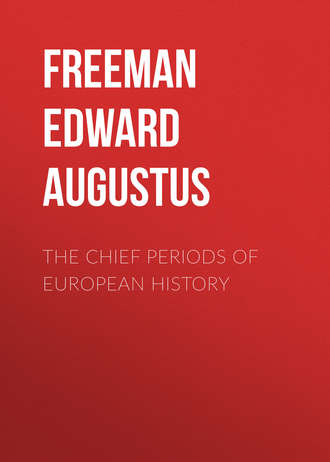 полная версия
полная версияThe Chief Periods of European History
The choice of that new sphere of Carthaginian energy, the exploits of the house of Hamilkar, the line of the sons of Thunder, of itself opens a new and important, though as yet a secondary, page in the history of Europe. The time has come for the most western of her three peninsulas to play its part in the general affairs of the world. But the peninsula which was not wholly Mediterranean, which had two of its three sides washed by the outer Ocean, was never to play such a part as the elder peninsulas which felt only the waters of the inland sea. A day was to come in ages still far distant when Spain should be a ruling power in Italy and in Greece. But Spain never was to be what Italy or what Greece had been, nor what Italy was to be again. For several centuries her fate was to be a great and flourishing dependency of Rome, which, when it had once fully accepted the dependent relation, was to be less disturbed either by civil wars or by foreign invasion than any other province of the West. And now her fate was a strange one, but a fate which the wonderful cycles of history brought back again after more than nine hundred years. Spain was to be as Sicily. One phase of the Eternal Question was twice to be whether the most western land of Europe should be a part of the Western or the Eastern world. Rome had to win the land from the grasp of the Phœnician; its own sons had in after ages to win it back from the grasp of the Saracen. For the moment the third of the great peninsulas was to be in turn the stronghold of either side, to be the arsenal where Carthage first gathered up her strength for the attempted overthrow of Rome, and where Rome then gathered up her strength for the more than attempted overthrow of Carthage.
The Punic Wars form a kind of episode in the history of Europe, just as the presence of a Punic people in the Western Mediterranean is of itself an anomaly and in some sort an episode. The existence of the Carthaginian power hindered what we might have looked on as the natural course of history for the three great European peninsulas. When Rome had become the undisputed head of Italy, the next growth of her power might have been looked for in the direction of the Gaul and of the Greek. The headship of Italy had been won by driving back a Greek invasion, an invasion from a Greek land within sight of Italy, and that headship might be looked on as imperfect till it was further spread over Sicily at one end and Cisalpine Gaul at the other. Sicily was at once fought for, and in the end won; but it had to be won from the intruding Carthaginian. When the first Punic War was over, the eyes of Rome were again drawn beyond the Po and beyond the Hadriatic. The conquest of Cisalpine Gaul was begun; the Illyrian wars led to the first establishment of Rome as an influence, as a power, in the Eastern peninsula. Protector, mistress in all but name, of Korkyra, Epidamnos, and Apollônia, Rome has become an element in the affairs of Greece herself as well as in those of Greek colonies in Italy, Sicily, Spain, and Gaul. She has won the jealousy of Macedonia, the good will of the free states of Greece. That is, she has taken the first steps towards bringing Greek friends and Greek enemies alike, first under her influence and then under her dominion.
If the first Punic War was in some sort an episode in European history, a check in the expected march of Rome, still more truly can this be said of the second. The Hannibalian War stands out in the history of the world as before all things a strife between a man and a commonwealth, a strife between the first of men and the first of commonwealths. Yet if Hannibal overshadows Carthage, if Carthage seems but an instrument in his hands, we must remember that Hannibal has no being apart from Carthage, that the work that he does is not the work of Hannibal but the work of Carthage. Nor must we let the glory of Hannibal altogether quench the glory of the other members of his house. Rome had to strive against a line of heroes, against the whole lion-brood of the house of Barak. One son of Thunder came after another; what the Grace of Baal began, the Help of Baal came to strengthen. But in our swift œcumenical survey we must be careful of tarrying to do homage even to the greatest of individual men. We have to deal with the results of their actions. The object of the Hannibalian war was the humiliation, the destruction, of Rome. Its effect was to raise Rome higher than ever, to make her in one generation the head of the whole West, before long to be the head of the East also. It brought, as we have seen, the western peninsula into the current of European affairs; it brought it into that current as a stronghold of Roman dominion; it made Rome a power out of Europe; she came out of the struggle more than ever the head of Italy, mistress of all Sicily, advancing to be mistress of Spain, holding a commanding influence in Africa. If she lost Cisalpine Gaul for a season, it was only for a season; the work could be done again, and Rome won an influence in Gaul beyond the Alps which was presently to stand her in good stead. From Eastern Europe her eyes are turned away for a moment, to be turned thither again in another moment with far more steadfastness. That which, but for the check given to the course of things by the great Hannibalian episode, we might have looked for as the next scene of the drama, now actually comes on the stage as an episode within the episode. Under cover as it were of the war with Hannibal, Rome for the first time wages war east of the Hadriatic as the ally of one of the chief Greek powers and as the enemy of another. But if that first war between Rome and Macedonia looks like an episode, if it seems trifling beside the great strife with Hannibal, that was merely because the Macedonian king failed to do what in reason he ought to have done, if he went to war at all. The phalanx and the siege-train of Philip failed to take their place alongside of the horsemen and the elephants of Hannibal. Still the first Macedonian war marks a most important stage in the advance of Rome towards the East. Rome now for the first time measured herself against the resources of a great kingdom, as in the war with Carthage she for the first time measured herself against the resources of a great commonwealth. Rome, Carthage, and Macedonia were now the three great powers of Europe, and Rome had to strive against both the other two at once. It was well indeed for Rome that Macedonia never put forth her full strength while the strength of Carthage was still unbroken. As it was, Hannibal alone, without allies save the barbarians whom he gathered to his standard, after the fearful losses of his Pyrenæan and his Alpine march, was able to win every pitched battle that he fought, and to bring Rome so near to destruction that no power but Rome could have come alive out of the trial.
Never in truth was the Eternal Question so near to its solution, so near to a solution which might have stifled the life of Europe for ever, as when Hannibal debated in his mind whether he should march straight from the field of Cannæ to the gates of Rome. It was a moment like that when it rested on the vote of the polemarch Kallimachos whether the thousands of Athens should meet the tens of thousands of Persia on the day of Marathôn. It is not for us to say whether such a march would have turned the destiny of the world for ever; it is enough that all that formed the life of Europe, all that was to form the life of Christendom, seemed at that moment to hang on the balance. The difficulty is fully to take in that Hannibal and his kinsfolk, the great house and the greatest of its sons, were in truth fighting in the same cause as the mere barbarian destroyers against whom the strife had to be waged at other stages of the long tale. Yet so it is; when we see Rome, with her citizens, colonists, and allies, holding up against the mercenaries of Carthage, when we contrast the votary of Jupiter with the votary of Moloch, we shall soon see on which side it was the abiding interests of mankind truly lay. It was after all in the worthiest of causes that the first of cities was pitted against the first of men. The overthrow of Carthage enabled Rome to go on to the overthrow of Greece; but if Greece was to have a conqueror, it was well that she should have a conqueror who could become a disciple in a way such as the Phœnician never could be. It is hard to name Hannibal along with Attila or even with Abd-al-rahman, yet the day of Zama, or rather the long endurance which made the day of Zama possible, must be set down by the still abiding world of Europe as a great salvation, a crowning mercy, alongside of the work of Aetius and Theodoric and the work of the elder Charles.
How it was that Rome and Europe lived through such a trial, what were the special causes which gave Rome strength to bear up through the most fearful of dangers, it is for special historians of Rome to tell. For us it is enough that Rome came forth out of the struggle mistress of the West, with Carthage spared to live on for rather more than fifty years as a Roman dependency. She was then to perish; her land was to become a Roman province; she was herself, after a hundred years of desolation, to rise again as a Roman city, the head of one of the greatest of Roman lands, the seat of a special and abiding form of Roman life, a life of more than seven hundred years, till the power of Rome in Africa gave way to Semitic invaders more terrible than the old Phœnician. The fight of Zama put an end to the long and wonderful episode of Phœnician power in the Western seas; it left Rome leisure to go on with her work, as conqueror and teacher in Western Europe, as conqueror and disciple beyond Hadria. Whether if Philip had put forth the full power of his kingdom and its allies, he and Hannibal together could have overthrown Rome, it is a waste of time to guess. It is enough for us to know and to rejoice that so it was not; Philip failed to act with Hannibal, and Rome could overthrow Hannibal and Philip, each in his turn. The first Macedonian war brought Rome into the thick of Greek affairs. The Greek states learned all of a sudden what Rome could be either as a friend or as an enemy. But they were slow to learn how truly the relation of either friend or enemy of Rome was only a step to the relation, first of Roman dependent, and then of Roman subject. They were not likely to learn the lesson; neither princes nor commonwealths are ever quick in learning such lessons. The Greeks of that day no more dreamed what Roman interference meant than the Greeks of a hundred and fifty years before had dreamed what Macedonian interference meant. No prince or people ever does in such cases fully understand what is coming. But, seeing Rome had been on the whole the immediate loser in the first Macedonian war, the Greeks of that day were still less likely to see how vastly Rome was a gainer by engaging in any Macedonian war at all. Men who had grown up as leaders in the several Greek states, who were used to look on Greece and the neighbouring powers as forming a world of their own, a world in which Roman interference was as little looked for as interference from another planet, were not likely to foresee the days that were to come before their own lives were ended. Philopoimên dreamed not yet of days when no Greek statesman dared to strike a blow or speak a word without the good will of the barbarian commonwealth which had become practically the mistress of them all. That they did not foresee those days was no special short-sightedness of Greeks or of commonwealths; it was the common short-sightedness of merely human statesmen, who had not, like their critics, the means of profitting by the experience of ages which were still unborn.
At the beginning of the second century B.C. the actual possessions of Rome were small indeed compared with what they were at its ending. When the century opened, Rome was the undoubted head of the West; it was by no means clear that she was ever to become head of the East as well. To rule that so she was to be was the work of that all-important and neglected age. At its beginning, Rome was head of Italy; she was winning back the dominion in Cisalpine Gaul which the Hannibalian war had cost her; but she had no provinces of her own separate winning; she had only the lands in Sicily, Sardinia, and Spain which she had taken over from Carthage, lands which in Spain at least needed frequent hard fighting to enlarge or even to keep. In Transalpine Gaul she had as yet no possessions; Massalia was still an independent and specially cherished ally. In Africa Carthage was an unwilling dependency; Massinissa of Numidia was a faithful and zealous vassal king, to be favoured and strengthened as long as Carthage was allowed to live. In Eastern Europe Rome had indeed begun her dominion beyond Hadria, a dominion as yet over allies and not over acknowledged subjects. But it was a dominion which did not stretch beyond certain points of coast immediately opposite to the Italian peninsula. Rome had appeared as a destroyer in more than one island and city in the heart of Greece; but she had done her work of havoc in fellowship with Greek allies, and, if she had shown herself at all in Greek warfare, it was only because Philip had chosen to be the ally of Hannibal, but not to be his ally in such a sort as to strike at Rome on her own ground. In the further East Pergamon was already the ally of Rome; Attalos and Eumenês were to be as Massinissa so long as either Macedonia or the Seleukid power needed watching on behalf of Rome. The Seleukid power was as yet neither friend nor enemy; Egypt was bound to Rome by a friendship of some standing, but friendship had not as yet brought dependence with it.
Let us look only twenty years later. Rome has not increased her immediate territory on the eastern mainland by a single district or city. But Kephallênia and Zakynthos have joined the company of Korkyra and Epidamnos; Aitôlia has entered the formal relation of Roman dependence; Macedonia has sunk to it as the penalty of warfare with Rome; she has risen again to at least formal independence as the reward of good service to the ruling commonwealth. Beyond her small possessions in Western Greece, Rome has in the Eastern world no dominion but that of influence; but through that dominion she is supreme. The vast dominion of Antiochos, the Great King, successor alike of Cyrus and of Alexander, has been cut short; driven back beyond Tauros, he has almost withdrawn from the Hellenic world; the lord of Asia, seeking for a moment to be lord of Europe, has sunk to be lord only of Syria and of such lands east of Syria as he can keep back from the grasp of the encroaching Parthian. In his stead, royal Pergamon, democratic Rhodes, a crowd of smaller powers, ready to receive the bounty of Rome, have parted out the solid peninsula of Asia among them. The Roman Senate, which so lately sat to devise means by which Rome might be saved from the grasp of Hannibal, now sits as a Court of International Justice for the whole civilized world, ready to hear the causes of every king or commonwealth that has any plaint against any other king or commonwealth, ready even to bend its ear to the voice of every party, of every man, that has any plaint against any other party or any other man within the smallest commonwealth. The Roman Fathers judge the causes of powers which are in theory the equal allies of Rome; they judge by virtue of no law, of no treaty; they judge because the common instinct of mankind sees the one universal judge in the one power which has strength to enforce its judgements. When Rome speaks, all obey; kings fall down at the threshold of the Senate-house, as entering an assembly of gods; they keep themselves humbly within the line that the Roman rod traces round them, even on soil that they have made their own. Rome in truth rules from the Hadriatic to the Euphrates no less than from the Ocean to the Hadriatic; but save in the old Roman land which is her own, save in the few provinces which she has taken over as part of the spoil of Carthage, her power is still everywhere a power of influence and nowhere of direct dominion.
The work of the hundred and fifty years which were to pass before Rome came to obey the rule of a single man was largely to change this power of influence into a power of direct dominion, in a word to change allied and dependent states into subject provinces. Let us look again in the later years of that same second century. Italy has extended herself, if not in formal language, if not in legal right, yet in the common speech of men, over all the lands within the Alps. Gaul is now the land beyond the Alps where Rome, now protector of Massalia, has won a mighty province, a province binding together Italy and Spain, and keeping her old ally as it were in ward. Spain has largely become a Roman land; it has altogether become a Roman possession, save only those mountain districts which so many conquerors, each in turn, have found it so hard to conquer. Africa is a province; Carthage is a wilderness; Numidia and Mauretania are helpless dependencies. East of the Hadriatic, not a few lands and cities, Athens, Sparta, Rhodes, Byzantium, the wise confederates of Lykia, still keep their formal independence. But direct dominion has widely advanced; if not as yet actually the rule, yet it is the fate which has overwhelmed the greatest powers; the kingdom of Macedonia is now the province of Macedonia; the kingdom of Pergamon, so lately enlarged out of Seleukid spoils, is now the province of Asia; Achaia, with Corinth lying waste, is, whether formally a province or not, at least so utterly dependent as to make the question as to its political state a question merely formal. Syria, Egypt, all the kingdoms of Asia, must count as vassals of Rome. If absolute freedom lives on anywhere in the Mediterranean world, it is where freedom is the shame of Rome rather than her glory; the independence which Rhodes and Athens keep but in name is kept in all its fulness by the pirates of Crete and the pirates of Kilikia.
So the headship of Rome was won over Italy and the Mediterranean world. A dominion had grown up of which mankind had never seen the like. No king of kings had ever come so near to universal rule as this city of cities. And now, in the last years of the second century and the early years of the first, came the question whether Rome could keep what she had won, the question, we might almost say, whether Rome could keep her own independent being. New powers arose to dispute her claim to be head of the West, to be head of the East, to be head of her own Italy. Gaius Marius came down from his car of triumph over Jugurtha, to march, in a new consulship, in new consulships crowded one upon another, to save Gaul, to save Italy, to save Rome herself, from the attacks of Teutonic invaders who had come before their time. Small are the remains that Aquæ Sextiæ can show to remind us of that great deliverance; yet we look up to the Mount of Victory, and feel that it was in the fates that the bones of our kinsfolk should fence in Massaliot vineyards; the day was not yet come for Gothia and Romania to be freely yoked together in the happy bride-ale of Narbonne. The day of Aquæ Sextiæ, the day of the Raudian fields, confirmed Roman headship in the West for five hundred years. It needed a longer struggle with Eastern powers strengthened by the arts of Greece – when Greece and Asia, allies and subjects, were goaded to revolt by the misdeeds of the ruling city – to secure Roman headship in the East, not for five hundred years only, but for thrice that time. And nearer still, on her own soil, at her own gates, within her own future walls, Rome had again to fight for life and death against Italian enemies. Another Pontius had come from the Samnite hills to root up the wood that sheltered the wolves of Italy. It needed the happy star of Lucius Sulla, it needed the last eager prayer of the Felix, the Epaphroditos, to the angered gods of Greece, to keep in being, not merely the lordship over Gaul and Asia, but the very life of Rome as one Italian city on her own hills.
Yet vain indeed was the struggle of Cimbri and Teutones, of Marsian and Samnite, of the Pontic king and his allies in Asia and in Europe. Rome came forth from her threefold trial the undoubted mistress of all. On no corner of Mediterranean soil was there any power left that could really dispute her will. The first century before and after our æra sufficed to gather in the spoil. Enemies and allies, independent and dependent, were to be changed into subjects; kingdoms were to sink to provinces; and, if some cities once more than sceptred still kept the forms of freedom, yet chains did in truth clank over them when the Senate and People of an independent commonwealth dared only to pass such decrees as might suit the pleasure of the nearest proconsul. Of Rome’s two great rival leaders, one was to spread her dominion to the Euphrates, the other to the Channel and the Northern Sea. The Syria of Gnæus Pompeius became Rome’s richest province; but the land of old Damascus and younger Antioch could never become a Roman land. The Gaul of Gaius Cæsar became a Roman land indeed, the abiding home of Roman life and Roman culture, the land that had the praises of its cities sung by Ausonius of Bordeaux and its whole life painted for us in full by the pencil of Sidonius of Auvergne. And above all things the possession of Syria and Gaul gave Rome a new position and laid on her new duties. One aspect of the second century before our æra is that the barbarian powers of the East are again threatening. The work of Alexander and Seleukos seems half undone. Rome had weakened the arms of their successors without taking their calling on her own shoulders. As it was with the pirates, so it was with the Parthians; so it was even with the barbarians to the north of Macedonia. During the time when the Greek commonwealths and kingdoms had ceased to be really independent, but when they had not yet formally sunk to the state of Roman provinces, neither of these frontiers of the civilized world was effectually guarded. The second century before Christ was therefore a great age of barbarian advance. Again, as Mommsen puts it, the world had two lords. A power grew up on the eastern border, before which the Macedonian kings of Syria gave way, and against which Rome herself could do little more than hold her own. That Sulla was the first Roman who had direct dealings with the Parthians marks the course of things. Parthia was waxing mighty while Rome was weakening the kingdoms which might have checked the growth of Parthia. The new barbarian power lived for three hundred years after Sulla’s day to be the equal rival of Rome, in whose strife with Rome both sides could boast of victories and momentary conquests, while neither could boast of any lasting weakening of its rival. And a day came when the Parthians, who had come within the range of Greek influences, whose kings boasted themselves as φιλέλληνες, had to give way to more vigorous champions of the Asiatic side in the Eternal Question. In a long rivalry of four hundred years, the regenerate Persian, strong in his national life and national religion, remained Rome’s truest and worthiest rival. Again each power felt the might of the other on its borders; what Galerius won Jovian had to give back. At last, when the great blow was coming on both alike, each sent forth as it were its own Hannibal to strike at the vitals of the enemy. Chosroes encamped within sight of Constantinople; Heraclius gave law to the Persian in the heart of his own realm. One might be curious to know how this great side of the world’s history looks in the eyes of those who draw the mystic line at the patriciate of Odowakar. Julian to be sure comes before the line; but the writings which record the deeds of Julian are a sealed book – unclassical, I believe, not of the golden or even of the silver age. As for Belisarius and Heraclius, they doubtless pass, either in East or West, for Greeks of the Lower Empire, as cowardly and effete as all their fellows.
But the growth of the Parthian power, continued, as far as universal history is concerned, in the power of the regenerate Persian, is after all only one aspect of a chain of events which was then already ancient and which still abides. It did but put the Eternal Question under new conditions and give either side new and stronger champions. Meanwhile in vast regions of the West, in one memorable corner of the East, conditions arose which were absolutely new. Pompeius, conqueror of Syria, caused the lands of Rome to march upon the Parthian; Cæsar, conqueror of Gaul, caused the lands of Rome to march upon the German. One gave her a neighbour who could be only an abiding rival; the other gave her a neighbour who would not be a subject, but who was, in the fulness of his time, to enter on his twofold calling as conqueror and disciple. And now our own history begins, the history of the Teutonic race in its three great homes, in the European mainland, in the great island of the Ocean, in the vaster mainland beyond the Ocean. I need tell no one here that in Cæsar’s day, in days ages after Cæsar, the history of ourselves, as distinguished from the history of our future home, is to be sought for, not by the Thames and the Severn, but by the Rhine and the Weser. We have not very long to wait before one line of Tacitus will reveal the existence of the Angle, before one line of Ptolemy will reveal the existence of the Saxon. But as yet we stand undistinguished among the mass of our brethren. Whatever is theirs is ours also. We have our part in the great deliverance by the wood of Teutoburg; Arminius, “liberator Germaniæ,” is but the first of a roll which goes on to Hampden and to Washington. By Rhine and Danube Rome at last found her Terminus; to extend it to Elbe or Eider was not for Drusus or Germanicus, but for the first Teuton who wore her crown.







